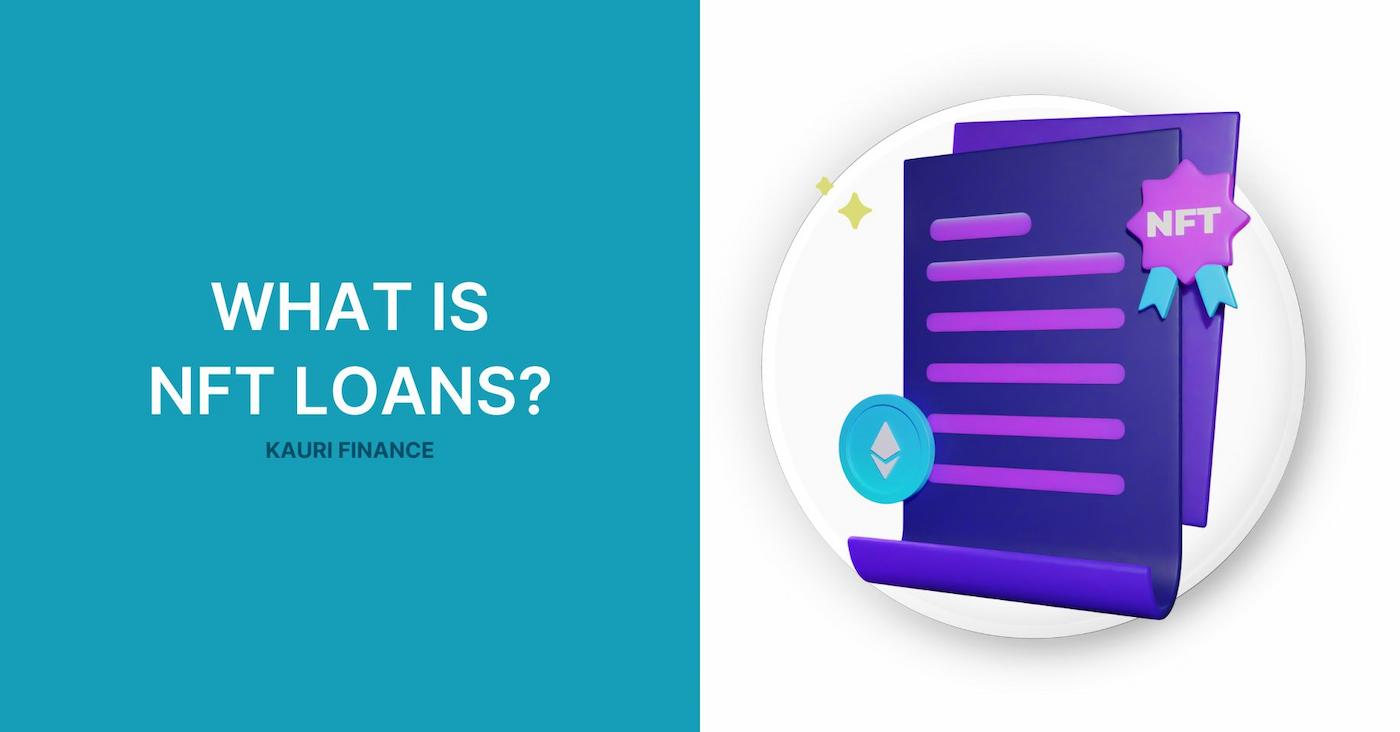
NFT Loans: Understanding the Basics
- What Are NFTs?
- Uses and Applications
- What Are NFT Loans?
- Growing Popularity
- How Do NFT Loans Work?
- Platform and Value Assessment
- How Do NFT Loans Work?
- Platform and Value Assessment
- Key Metrics to Understand About NFT Loans
- Liquidation Processes
- Advantages of NFT Loans
- Risks Associated with NFT Loans
- Conclusion

We at Kauri Finance are excited to talk about the unique field of NFT loans, a financial service that is increasingly evolving as a powerful tool for NFT holders to leverage their digital assets for liquidity. This new practice is becoming increasingly popular among investors who want to access funding without liquidating their unique digital assets. In this article, we'll review the key aspects of NFTs, dive into the mechanics of borrowing against NFTs, and discuss important metrics and considerations when using NFTs as collateral. Join us at Kauri Blog to understand the intricacies of NFT loans and their role in the digital economy.
What Are NFTs?
NFT represents a new kind of digital asset that is distinctly different from common cryptocurrencies. Hosted on blockchain technology, each NFT is a unique cryptographic token that cannot be replicated or substituted on a one-to-one basis. This uniqueness sets NFTs apart from fungible tokens such as Bitcoin or Ethereum, which are identical to one another and can be used interchangeably. The value of an NFT stems from its rarity and the specific characteristics that it possesses, making each NFT unique and valued differently within the market.
Uses and Applications
NFTs have found a wide array of uses that extend far beyond simple collectibles. They have fundamentally changed how we perceive ownership and trade of digital content:
- Digital Art: NFTs have revolutionized the art world by providing artists with a platform to tokenize their work, thereby ensuring authenticity and ownership while also enabling artists to profit from secondary sales through smart contracts.
- Gaming Assets: In the gaming industry, NFTs allow players to truly own in-game items and assets, such as exclusive skins or characters, which can be traded or sold outside the gaming platforms, often in NFT marketplaces.
- Virtual Real Estate: Platforms like Decentraland use NFTs to represent ownership of virtual land parcels. These digital properties can be developed, monetized, or traded, similar to real-world real estate but within virtual environments.
What Are NFT Loans?
NFT loans represent a novel financial service in the DeFi (Decentralized Finance) landscape, where digital assets, specifically Non-Fungible Tokens (NFTs), are used as collateral to secure loans. This type of financing diverges from traditional lending models by allowing NFT owners to leverage their digital assets without liquidating them. This is particularly appealing for those who wish to retain their digital assets while accessing needed funds.
Growing Popularity
The surge in value and mainstream acceptance of NFTs has catalyzed the development of innovative financial services such as NFT loans. These services provide essential liquidity to NFT holders, enabling them to monetize their assets in a flexible manner. As NFTs continue to permeate various sectors art, gaming, and real estate NFT loans become increasingly vital, offering financial solutions that preserve the ownership of digital assets while unlocking their economic value.
How Do NFT Loans Work?
The process of obtaining an NFT loan typically follows these steps:
- Collateral Submission: An NFT holder places their NFT as collateral on a lending platform that supports NFT loans.
- Loan Request: The borrower then requests a loan amount, which is a percentage of their NFT's appraised value.
- Value Appraisal: The lending platform or other participants appraise the NFT to determine its current market value, which influences the loan amount.
- Loan Issuance: Once the appraisal is complete and a loan agreement is reached, the borrower receives the loan amount, usually in a cryptocurrency like Ethereum or a stablecoin.
- Repayment and Unlocking: The borrower must repay the loan within the agreed timeframe, including any accrued interest, to regain ownership of their NFT. Failure to repay results in the NFT being liquidated or transferred to the lender.
Platform and Value Assessment
Assessing the value of an NFT for loan purposes is complex due to the unique and often subjective nature of each NFT. Factors influencing an NFT's value include its rarity, the reputation of the artist or creator, past sales, and overall market demand. Platforms that facilitate NFT loans often rely on recent sales data and expert appraisals to set loan values, but the nascent nature of the market can make this challenging. A robust secondary market for NFTs is crucial as it provides a reference point for valuations, ensuring that loans are based on realistic and current market prices. This aspect of NFT lending highlights the need for continued development and maturation of the NFT marketplace to support accurate and fair lending practices.
How Do NFT Loans Work?
The process of securing an NFT loan involves several key steps:
- Collateral Submission: The borrower submits an NFT as collateral on a lending platform that specializes in such assets.
- Loan Application: The borrower applies for a loan, specifying the desired amount, which usually cannot exceed a certain percentage of the NFT's appraised value.
- NFT Appraisal: The platform assesses the value of the NFT, which involves analyzing its market value, rarity, demand, and previous sale prices. This step is crucial for determining the loan amount.
- Loan Issuance: Once the value is established and the loan terms are agreed upon, the loan is issued in stablecoin or another cryptocurrency. The NFT is locked in a smart contract as collateral.
- Repayment and Release: The borrower must repay the loan along with any interest by the due date to reclaim their NFT. Failure to repay results in the NFT being forfeited to the lender.
Platform and Value Assessment
Valuing NFTs for loan purposes presents unique challenges due to their intrinsic uniqueness and the subjective nature of their worth. Platforms that offer NFT loans typically require a comprehensive assessment that considers factors such as the artist's reputation, the piece's rarity, its historical price, and current market trends. The subjective valuation is often mitigated by the existence of a robust secondary market, which can provide more data points and enhance the accuracy of appraisals. However, the volatile nature of the NFT market means that valuation can fluctuate significantly, affecting the stability of the loan terms.
Key Metrics to Understand About NFT Loans
Interest rates on NFT loans can vary widely based on the platform and the perceived risk associated with the NFT collateral. These rates are crucial for borrowers to consider, as they affect the total repayment amount.
Loan-to-Value (LTV) ratio is another critical metric. It represents the percentage of the NFT's value that the loan amount represents. For example, an LTV ratio of 50% means the loan is worth half of the NFT’s appraised value. Higher LTV ratios may be more risky, as they leave less room for price fluctuations before the loan becomes under-collateralized.
Liquidation Processes
If a borrower fails to meet the loan terms, particularly failing to repay the loan on time, the NFT used as collateral can be liquidated. This means the lender has the right to sell the NFT to recover the loan amount. Liquidation typically occurs automatically through a smart contract when the loan's LTV ratio reaches a predetermined threshold, known as the liquidation ratio. This process is designed to protect the lender from losses but can result in significant losses for the borrower, both financially and in terms of losing the NFT asset.
Advantages of NFT Loans
- Unlocking Liquidity: NFT loans allow holders of high-value non-fungible tokens to access liquidity without relinquishing ownership of their assets. This is especially valuable for those who anticipate an increase in the value of their NFTs and need immediate financial resources.
- Expanding Access to DeFi: NFT loans open the door for digital art owners and collectors to engage with decentralized finance. By using their digital assets as collateral, these individuals can participate in various DeFi activities, enhancing the utility and financial leverage of their NFT holdings.
- Accessibility: Unlike traditional loans, NFT-backed financing does not require credit checks. This accessibility is a critical advantage, especially for individuals without a strong credit history or access to conventional financial services.
Risks Associated with NFT Loans
- Price Volatility: The market for NFTs is notoriously volatile. The unique nature of each NFT, combined with fluctuating market demand, can lead to significant price swings. This volatility makes it challenging to establish a stable collateral value for loans, potentially leading to situations where the NFT's market value falls below the borrowed amount, triggering a liquidation.
- Liquidity Issues: Compared to more liquid assets like traditional cryptocurrencies, NFTs can be harder to sell quickly at market value. This lack of liquidity becomes a substantial risk if the borrower defaults on the loan and the asset needs to be sold to recover the borrowed funds.
- Smart Contract Vulnerabilities: As with any DeFi protocol, NFT loans are managed by smart contracts on the blockchain. These contracts can contain vulnerabilities or bugs that might be exploited by malicious entities, potentially leading to the loss of both funds and digital assets.
- Regulatory Uncertainties: The regulatory landscape for NFTs and DeFi is still evolving. Future regulatory changes could affect the operation of NFT loans, introducing new compliance requirements or restricting certain practices. These potential regulations add a layer of uncertainty to the viability of NFT loans.
Conclusion
While NFT loans offer innovative financial opportunities for digital asset owners to leverage their NFTs, they also come with significant risks that need careful consideration. The dual nature of these loans, as tools for financial flexibility and as sources of potential risk, highlights the importance of thorough research and careful planning. Potential borrowers should consider consulting financial experts to navigate the complexities of NFT loans and ensure that their investments align with their financial goals and risk tolerance.
